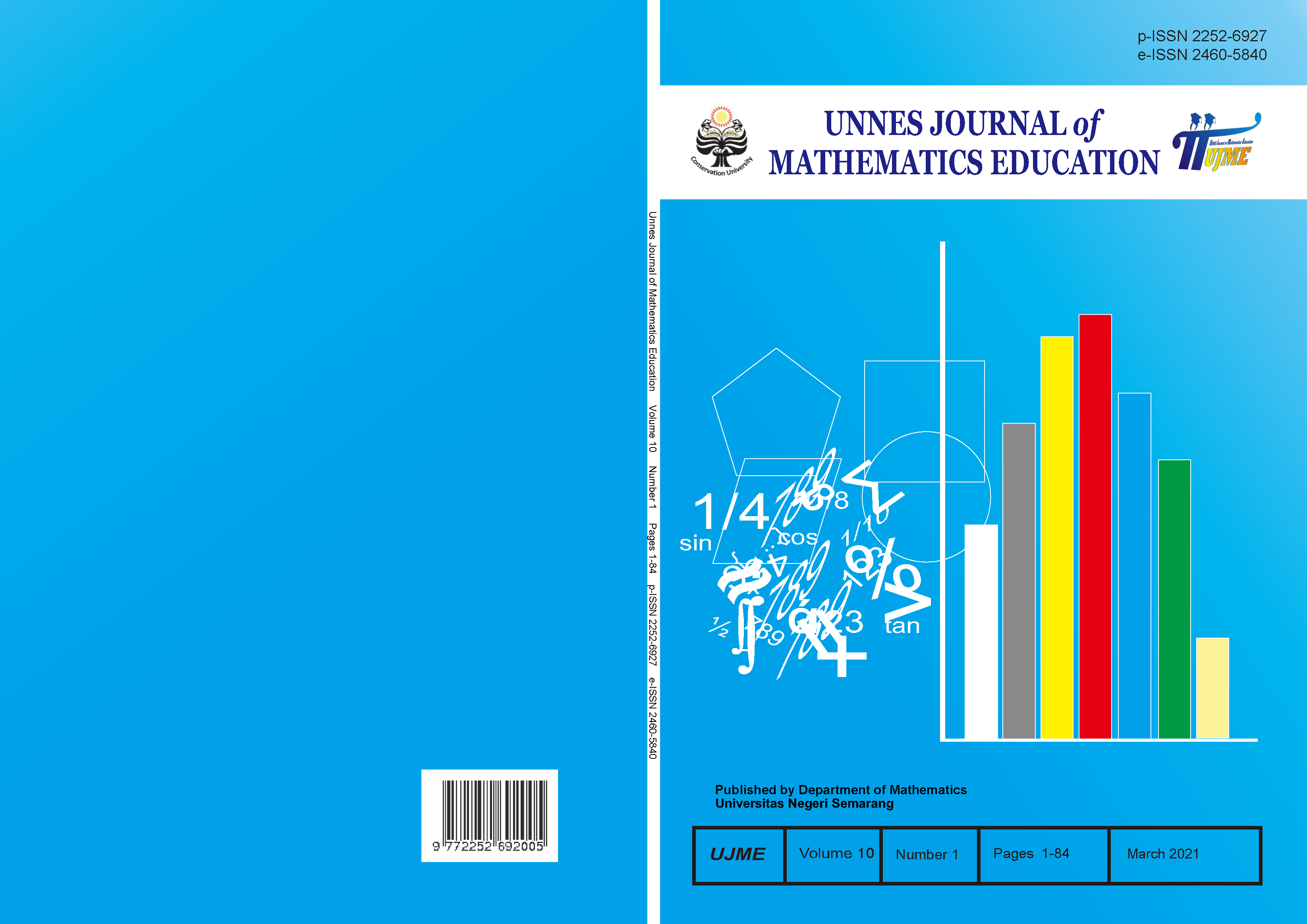Problem solving ability based on Newman procedure in Team Games Tournament learning
##plugins.themes.academic_pro.article.main##
Abstract
The purpose of this research were to describe about how was the learning quality of Team Games Tournament (TGT) in students' mathematical problem solving abilities, and to describe about how were students' problem solving abilities based on Newman's procedures. The research method used was a mixed method where students are subjected to TGT learning models. The population used in this study were students of class VIII in one of junior high school in Pekalongan in the even semester of the 2018/2019 academic year distributed in four classes and the sample used was class VIIIC. The subjects in this study was selected by using purposive sampling techniques with consideration that the selected subjects can represent each category of mathematical problem solving abilities. Based on the results of the analysis, it can be concluded that learning process of TGT that have been conducted in the research class is in accordance with the lesson plan and other support devices or tools that has been made by researchers. Based on observations made by the observer, the criteria obtained for students and teacher activities were very good. The average learning outcomes of class VIIIC students that were subjected to TGT learning model in students' mathematical problem solving abilities have reached mastery learning. Research subjects that have high problem solving ability generally know the location and cause of the error when working on a problem, research subjects that have problem solving ability are partially aware of the location and cause of the error when working on a problem, and research subjects who have low problem solving ability generally do not know the location and cause of the error when working on a problem.
##plugins.themes.academic_pro.article.details##
References
Budiyono. (2003). Metodologi Penelitian Pendidikan. Surakarta: UNS Press.
Clements, M. A., & Ellerton, N. F. (1996). The Newman Procedure for Analysing Errors on Written Mathematical Tasks. Retrieved January 12, 2017.
Creswell, J. W., & Creswell, J. D. (2017). Research Design: Qualitative, Quantitative, and Mixed Methods Approaches. Sage publications.
Huda, Miftahul. (2011). Cooperative Learning: Metode, Teknik, Struktur dan Model Penerapan. Pustaka Pelajar: Yogyakarta.
Irfan, M. (2017). Analisis Kesalahan Siswa dalam Pemecahan Masalah Berdasarkan Kecemasan Belajar Matematika. Kreano, Jurnal Matematika Kreatif-Inovatif, 8(2).
Junaedi, I. (2014). Tipe Kesalahan Mahasiswa dalam Menyelesaikan Soal-soal Geometri Analitik Berdasar Newman's Error Analysis (NEA). Kreano, Jurnal Matematika Kreatif-Inovatif, 3(2), 125-133.
Lestari, P. (2017). Penerapan Model Pembelajaran TGT Berharga untuk Meningkatkan Aktivitas dan Hasil Belajar Kalor Siswa Kelas XA SMAN 1 Gemuh. Jurnal Profesi Keguruan, 3(2).
NCTM. (2000). Principles and Standards for School Mathematics. Reston, VA: NCTM.
Organisation for Economic Cooperation and Development (OECD). 2016. PISA 2015 Result in Focus. Available at http://www.oecd.org/pisa/PISA-2015-Indonesia.pdf.
Peraturan Menteri Pendidikan dan Kebudayaan (Permendikbud) Nomor 103 Tahun 2014 Tentang Pembelajaran pada Pendidikan Dasar dan Pendidikan Menengah. Kementerian Pendidikan dan Kebudayaan
Sam, H. N., & Qohar, A. (2016). Pembelajaran Berbasis Masalah Berdasarkan Langkah-langkah Polya untuk Meningkatkan Kemampuan Menyelesaikan Soal Cerita Matematika. Kreano, Jurnal Matematika Kreatif-Inovatif, 6(2), 156-163.
Slavin, R. E. (1980). Cooperative learning. Review of educational research, 50(2), 315-342.
Sugiyono. (2010). Statistik untuk Penelitian. Bandung: Alfabeta.
Sulistyaningsih, D., & Prihaswati, M. (2014). Penerapan Model Pembelajaran Kooperatif Team Game Tournament untuk Meningkatan Keaktifan dan Kemampuan Pemecahan Masalah Materi Simplex. AKSIOMA: Jurnal Matematika dan Pendidikan Matematika, 5(1/MARET).
Trianto. (2010). Mendesain Model Pembelajaran Inovatif-Progresif: Konsep, Landasan, dan Implementasinya pada Kurikulum Tingkat Satuan Pendidikan (KTSP). Kencana: Jakarta.
